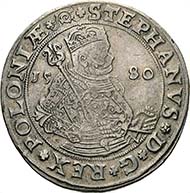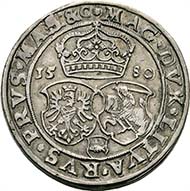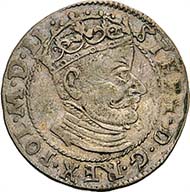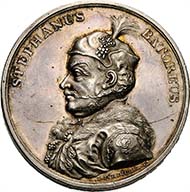November 6, 2009 – Eight lots related to the Polish king Stephen Báthory were offered in auction sale 183 of the company Gorny & Mosch, Giessener Münzhandlung, Munich, with an estimate of 3.380 Euros. The end result added up to incredible 124.000 Euros*. A taler from 1850, struck at the Olkusz mint, brought with its price of 103.500 Euros more than 40 times its estimate which, with its 2.500 Euros, was rather conservative. This king’s fractions rose to unimagined heights as well. A Lithuanian groschen from 1580 which was struck at the Vilnius mint with a nice toning but “only” almost very fine cost 9.200 Euros instead of its estimate of 180 Euros.
As a matter of fact, even a silver medal made at the end of the 18th century benefited from the Polish king’s popularity. The piece which was estimated at 300 Euros climbed up to 3.335 Euros as end result – a tremendous sum for a medal of that period.
Who was this king Stephen Báthory of Poland who is so popular amongst Polish collectors? Báthory was born in 1533 as son of a Transylvanian nobleman. He took service with John Sigismund Zápolya who was elected ruler by the Hungarian magnates after Louis II of Hungary had died in the battle of Mohács in 1526. Only a few months later another fraction of the nobility elected Ferdinand I Archduke of Austria who pretended to the Hungarian throne on the basis of a marriage contract. His forces prevailed and Zápolya sought the support of the Ottoman ruler who gladly granted relief. The impressive demonstration of power of the Ottoman Empire with the Siege of Vienna forced Ferdinand to acknowledge Zápolya as the country’s ruler.
When Zápolya died in 1571, Stephen Báthory was elected Voivod of Transylvania supported by the Turkish sultan. After only five years he transferred this dignity to his brother since a higher honor awaited him. The Polish chancellor passed him the Kingship of Poland in return for Báthory marrying the 53-year-old sister of the last Jagiellon. By assumption of office the newly crowned king antagonized King Maximilian II as well as the Russian tsar who both regarded Poland as their natural sphere of interest. It was sheer luck that the emperor died shortly before the planned invasion and the papal nuncio forged an alliance between the new emperor and the Polish king to defend the Western world.
Thereby, Báthory was able to become the Russian tsar’s big opponent pushing back the overwhelming neighbor’s influence in three campaigns. His expeditions led him to Pskov whose siege was ended by a ceasefire with Ivan the Terrible. He ceded huge parts of Livonia to Báthory and the Polish crown. The Polish king becoming the Counter-Reformation’s stronghold wanted to make use of his powerful empire as shelter against the Turks. This plan was foiled when suddenly he died of a stroke in 1586. Hence, the coinage of Báthory reminds every Polish collector of a historic highlight of an independent and powerful Poland prevailing against the Turks as well as the Russians. No wonder then that Báthory’s coins are very popular collectibles and the rarities amongst his coinage reach unbelievable prices.
You can find more results of the auction sales week of Gorny & Mosch on the Internet at www.gmcoinart.de. The final result of the four auctions sales comprising roughly 5.700 lots added up to approximately 4.1 million Euros. Namely the results of the Ancient and the Russian coins once again assert Gorny & Mosch’s rank as German market leader in these fields.
No. 8004: Stephen Báthory. Taler, 1580, Olkusz. Kopicki 550 (R8). Hutten-Czapski 637 (R7). Dark patina. Good very fine/almost extremely fine.
2.500 / 103.500 Euros
No. 8008: Stephen Báthory. Lithuanian groschen, 1580, Vilnius. Kopicki 3354 (R7). Hutten-Czapski 655var. Nice toning. Almost very fine.
180 / 9.200 Euros
Nro 8020: Hereditary medal of Johann Jakob Reichel at Warsaw in memory of Stephen Báthory. Hutten-Czapski 3432 (R3). Die error, very fine to extremely fine.
300 / 3.335 Euros
* All prices include 15% VAT.










